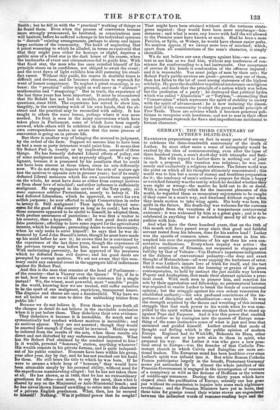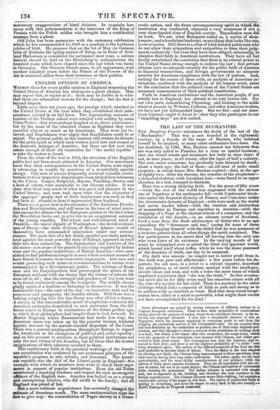GERMANY: THE THIRD CENTENARY OF LUTHER'S DEATH-DAY.
EXTENSIVE preparations are on foot in many parts of Germany to celebrate the three-hundredth anniversary of the death of Luther. In most other cases a sense of incongruity would be excited by the idea of commemorating, even after the Ism of three hundred years, a man's death-day with triumphs and festi- vities. But with regard to Luther there is nothing out of joint in such a proposal. His vocation was religious; he was emi- nently and exclusively a religious reformer. The future world was the point on which all his thoughts ultimately concentrated ; this world was to him but a scene of stormy and troublous preparation for it; the tendency of men's actions to prepare for them a happy• or wretched futurity was the test by which he decided whether they were right or wrong—the motive he held out to do or desist. With a strong healthy relish for the innocent pleasures of this world, he regarded them as momentary enjoyments to be caught if they came in a man's way, and dismissed without regret when they made motion to take wino. again. His body was here, his spirit in the future. His death-day was welcome for the surcease it brought from the vexations of a tempestuous controversial existence : it was welcomed by him as a great gain; • and is to be celebrated in anything but a melancholy mood by all who sym- pathize with him.
And what have the three hundred years, that on the 18th of this month will have passed away since that good and faithful servant rested from his labours, done for his native land Luther was the apostle of common sense. Common sense in him tri- umphed less over the superstitions of his age than his own con- servative inclinations. Everywhere inquiry was active : the playful scepticism of Erasmus, not surpassed in elegance and subtilty by that of Voltaire—Von Hutten's impetuous indignation at the dulness of conventional pedantry—the deep and exact thought of Melanchthon—all were sapping the buttresses of error. But it was Luther's innate love of truth for itself, and the tact which enabled him, without the learning or genius of his great contemporaries to hold by instinct the just middle way between
Popery and An j
Anabaptism, that made their abstract opinions a prac- tical creed. With such men to pioneer him, and sanction his acts by their approbation and fellowship, no preternatural heroism was required to enable Luther to break the bonds of conventional opinion ; but the struggle against his own ardent veneration for established authority—his own profound convictions of the im- portance of discipline and subordination—was terrible. It was the strength acquired by the throes and wrestling: of this internal struggle that lent such power to his words when he was com- pelled by the spirit within him stronger than himself to stand up against Pope and Emperor. And it was this power that enabled him to infuse as by contagion into the masses of Europe some- thing of the same instinctive sense of what is just and true that animated and guided himself. Luther created that mode of thought and feeling which is the public opinion of modern Europe. England had its Wickliffe, Bohemia its Huss other lands men of more or less note akin to them in spirit, who prepared his way. But Luther it was who grave a new prac- tical creed to Europe—was the founder of that Catholic Pro- testant church in which Calvin and Zuinglius are mere sec- tional leaders. The European mind has been healthier ever since Luther's spirit was infused into it. But while Roman Catholic France participates largely in the benefit, Protestant Germany seems yet untouched by it. Almost the whole intellect of the Prussian Government is engaged in the investigation of rumours of a conspiracy as wild as the fictions of Hoffman or the writers of middle-age romances. During the thirty years which have elapsed since the pacification of Europe, scarcely one has gone pas without its commission to inquire into some such nightmare revelations : and the Prussian Ministers have yet to learn, that these tales for gossips round their winter stoves are engendered between the indiscreet words of romance-reading boys and the mercenary exaggerations of hired delators. In exquisite her- monywith this gobemoucherie is the interview of the King of Prussia with the Polish soldier who brought him a confidential Message from a ghost. Old Jahn has been premature with the centenary, celebration which he has recommended for 1847 as a pendant to the Lutheran jubilee of 1846. He proposes that on the 1st of May (in German tales of diablerie the spring-assizes of Satan, as in those of Scot- land Halloween is considered the autumnal) next year, a solemn festival should be held on the Blocksberg to commemorate the hundred years which have elapsed since the last witch was burnt in Germany. Our German friends must, to all appearance, wait another hundred years before the Prince of the Powers of the Air is exorcised either from their literature or their politics.



























 Previous page
Previous page